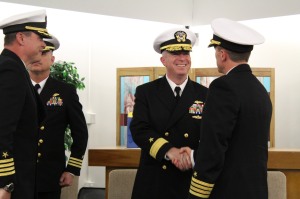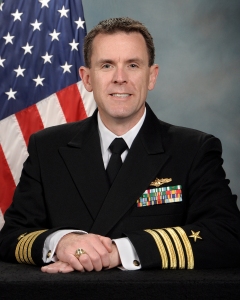Mistakes Happen
Before enlisting in the Navy, I was in college working toward a bachelor’s degree in business. I had no idea what I wanted to do with my life, but what I didn’t want to do was graduate college with no career goals and a load of debt. So I joined the Navy.
I was the first in my family to join the military, and I taught my family the importance of military service. I scored high on the Armed Services Vocational Aptitude Battery test and signed a contract to be a linguist specializing in modern standard Arabic. I breezed through boot camp and found myself at the Defense Language Institute in Monterey, California. Life was easy, and I was doing well in school. I had friends, and we spent all week studying our languages and most weekends together drinking and blowing off steam. I was getting good grades, volunteering, and had all my required duty qualifications. What could go wrong?
Life went on like this for about six months. The night that forever altered my career started when a couple of my shipmates came back late for curfew. They were returning from a party I had attended, and it was discovered there had been drinking. The command led a monthlong investigation until every person who had attended the party was identified. Every one of us was sent to a disciplinary review board.
Suddenly, I went from being an asset to the Navy to being expendable. I was told the Navy didn’t need me, the Navy couldn’t trust me, and that I would be lucky if I were allowed to stay in the Navy. I went to captain’s mast. My departmental leaders assured me they would vouch for me. Unfortunately, my captain let no one speak on my behalf. This led to me being awarded every nonjudicial punishment (NJP) except administrative separation. I lost half a month’s pay for two months and was demoted, put on restriction, given extra military instruction, and kicked out of school. In addition, the entire command was required to witness the captain’s mast at 0400.
Life after NJP
Life after NJP was terrible. No one would look at me or speak to me, and everything I had worked for was taken. I served 30 of my 45 days of restriction before receiving new orders and leaving the command. I was sent to the USS America (LHA-6) as an undesignated Sailor.
Being an undesignated Sailor was demoralizing. I hadn’t been in the Navy long enough to use tuition assistance to go to school; I had no advancement to study for; and I was surrounded by negativity. I worked with Sailors who had been undesignated for years, trying and failing to get picked up for a rating. I spent weeks on end working from sun up to sun down, and for what? I was told I wasn’t going to get a real job because of my record and that I should take whatever the Navy gave me. Day after day, the reasons to give up expanded.
Overcoming Adversity
I finally realized that if I wanted my life to change, I would have to change. From then on, I picked up collateral duties, started pushing to acquire more qualifications, and went after my enlisted surface warfare pin.
Although these new goals changed my attitude, I still had to learn how to ignore the negative words from those around me. When I had been on my ship for a year, it was time to apply for a job. I decided to try for information systems technician, understanding that I was unlikely to get the job because of my record. As I waited for the results, I continued working toward my goals, and a month later I earned my surface warfare qualification. I was the first sailor in my department to get pinned. The day I got pinned also was the day I found out I had been picked for the information systems technician job. I cried tears of joy when I learned I would be getting new orders and leaving behind my past.
Over the next three months, I earned my enlisted air warfare pin as well as my enlisted information dominance pin. Yet, again I was told it would be impossible to get what I wanted. I was even told that leaving with three pins would “hurt the integrity of the program” because I was only a seaman. I was determined, however. I earned my third pin the same day I departed the ship. I was the first seaman on the ship to earn the enlisted information warfare pin, and the first sailor on the ship to complete all three warfare programs.
Invest in Sailors
Over the past three years I have seen an incredible gap in leadership. Sailors of all ranks and rates have made mistakes and been knocked down, yet more senior Sailors show no compassion for junior Sailors in these situations. Putting down our Sailors after they get into trouble, questioning their character, and stripping them of opportunities sets them up for further failures and tells them that the Navy will not take care of them. How can we trust these Sailors to fight for the Navy and defend their ship if they don’t believe the Navy will fight for them? If we want our Sailors to look out for each other and us in both good times and bad, then we, as leaders, must do the same and fight for them.
The Navy should offer training to Sailors who are awarded NJP and counseling on how they can turn their careers around. These Sailors need to hear from other Sailors who have been in trouble that it is possible to overcome those obstacles. They need support, leadership, and guidance. NJP is the punishment; there is no reason the rest of their careers also should feel like a punishment. Right after NJP is our greatest opportunity to provide guidance and care to our Sailors. We need to look out for all Sailors, but especially those who are having difficulties. Building strong and resilient Sailors creates Sailors we can trust to stand by our side and carry out the mission. Overcoming adversity is one of the most important traits we can instill in our shipmates, and life after NJP is our best opportunity to do so.
Petty Officer Heck enlisted in the Navy when she was 20. She currently is a member of the precommissioning unit of the Portland (LPD-27) in Pascagoula, Mississippi.



























